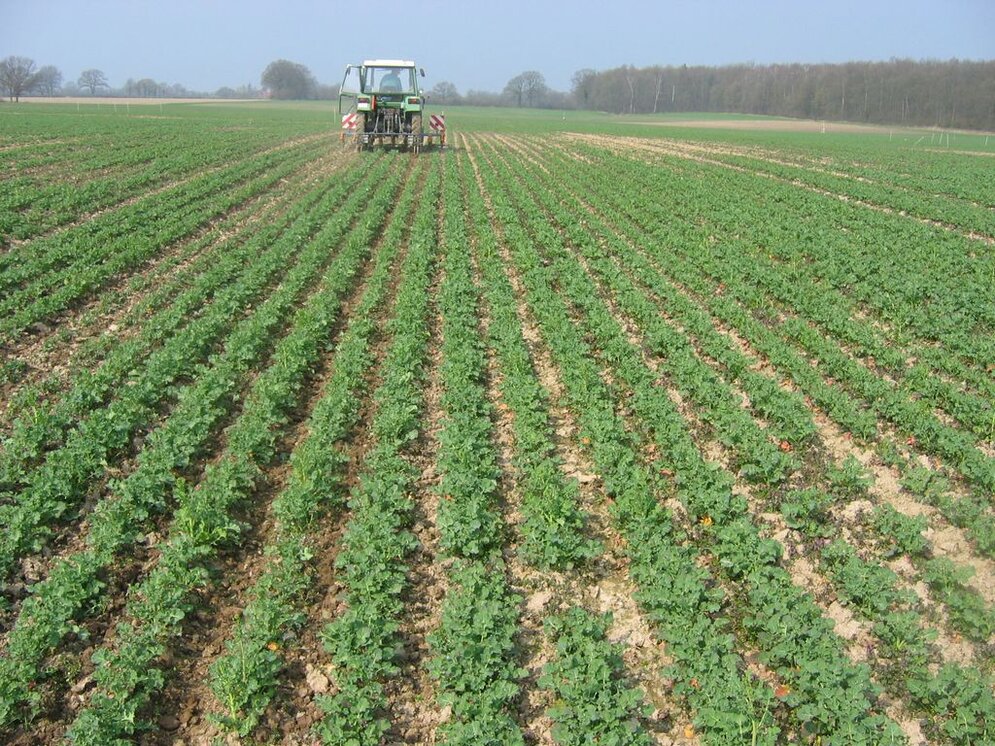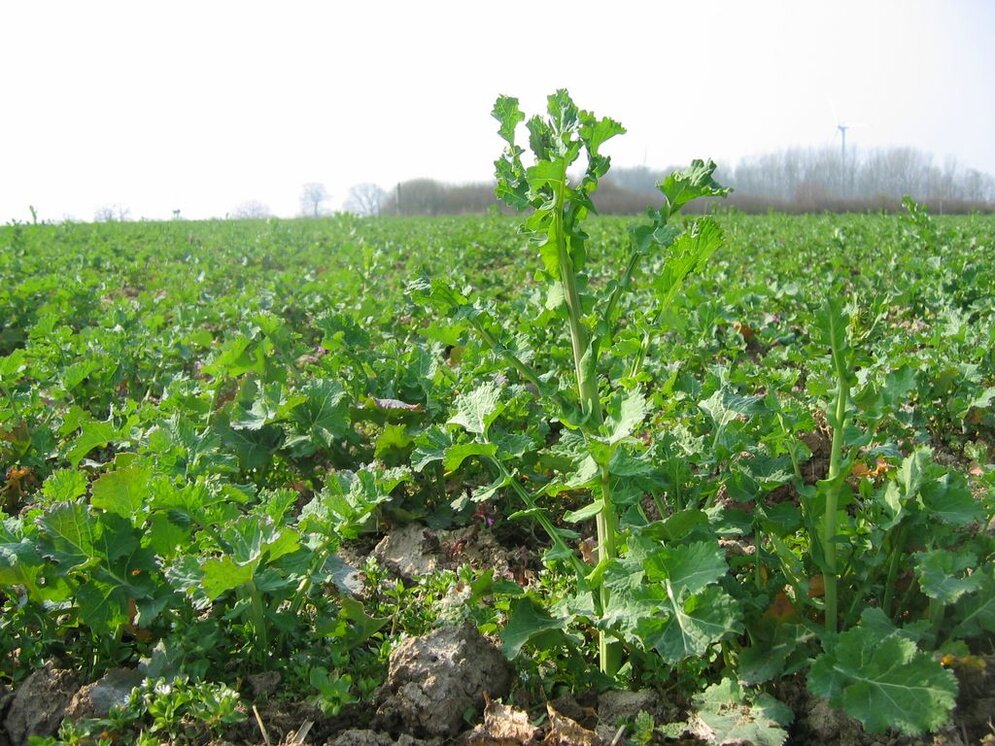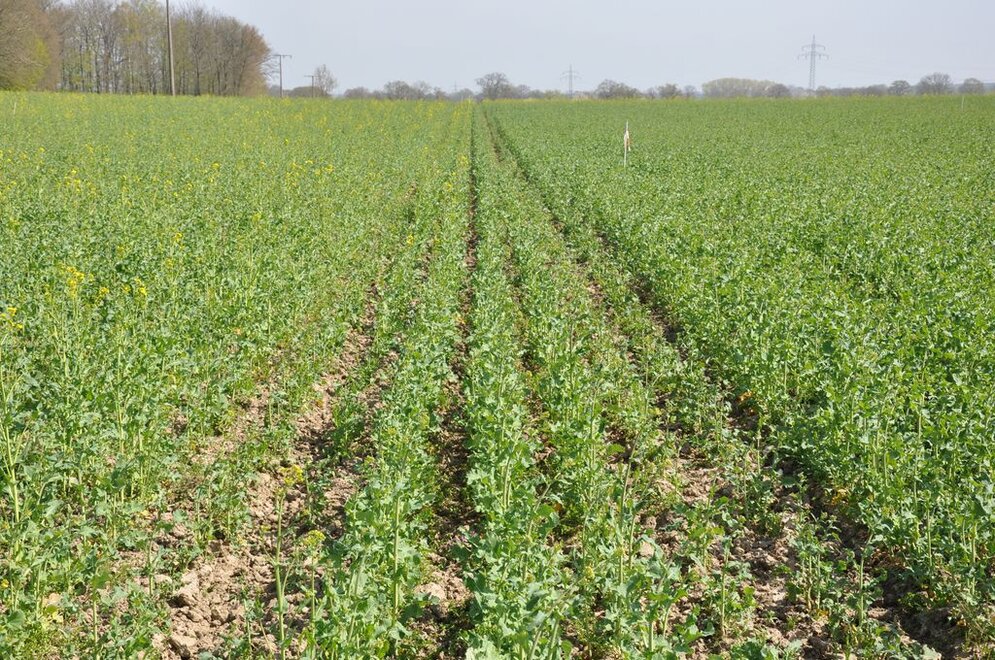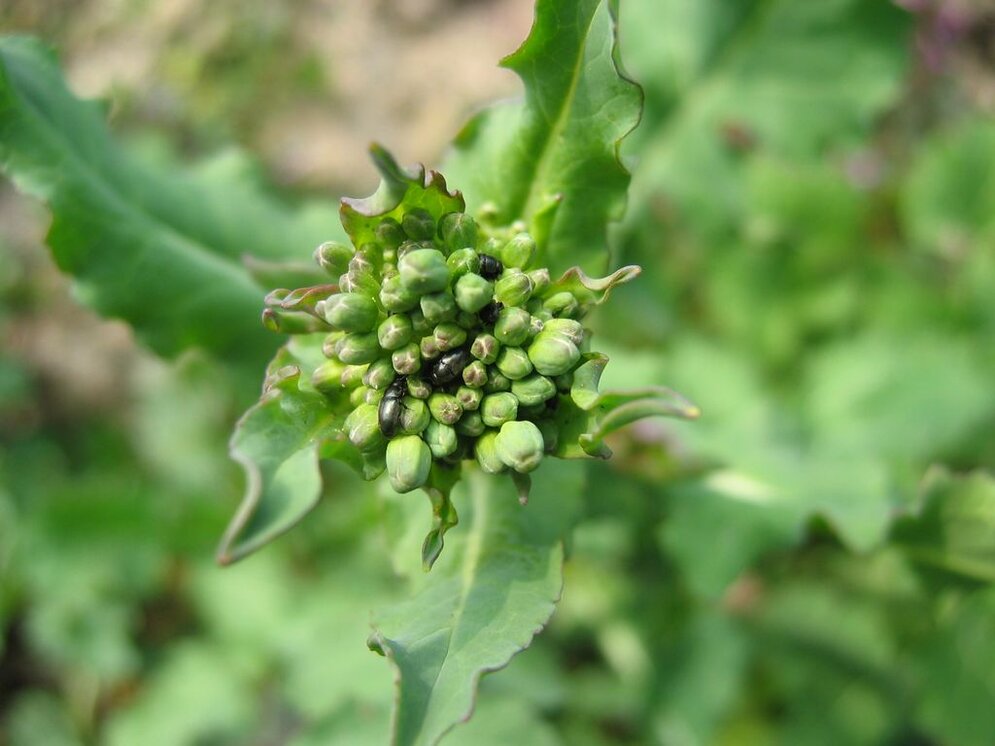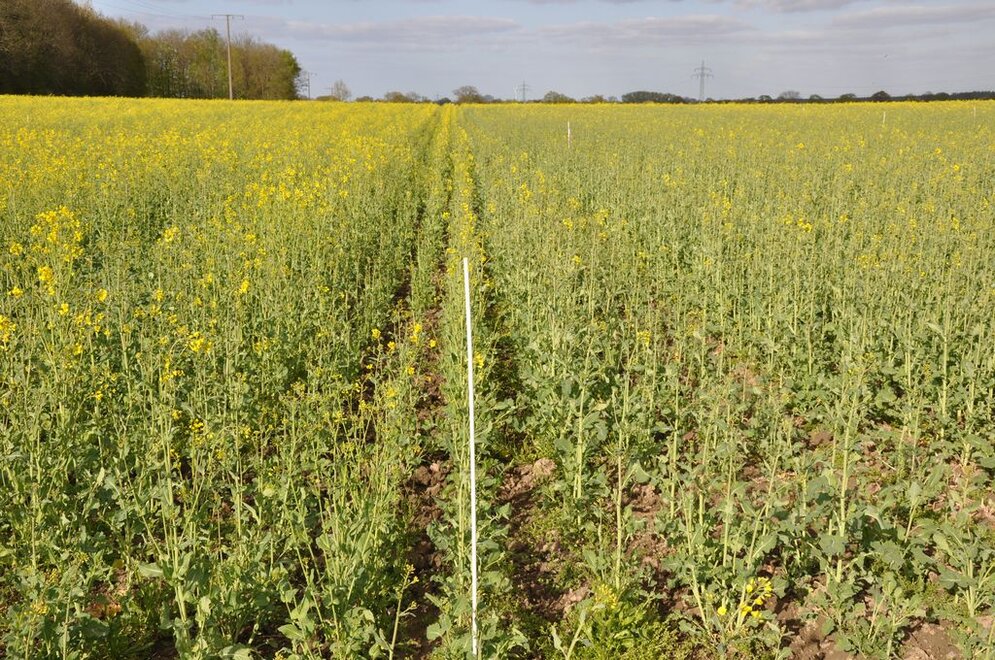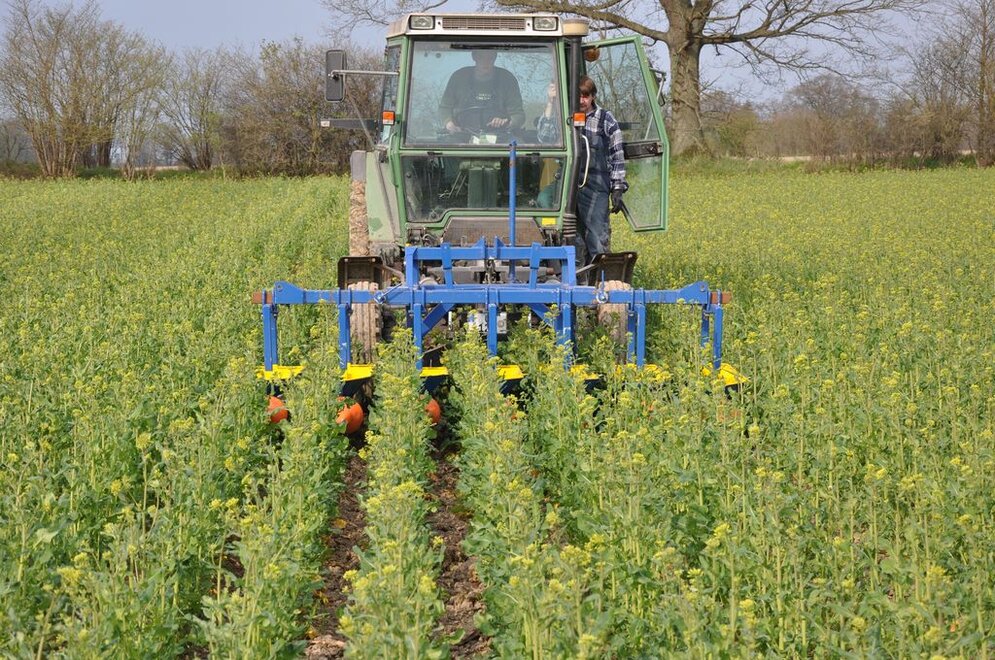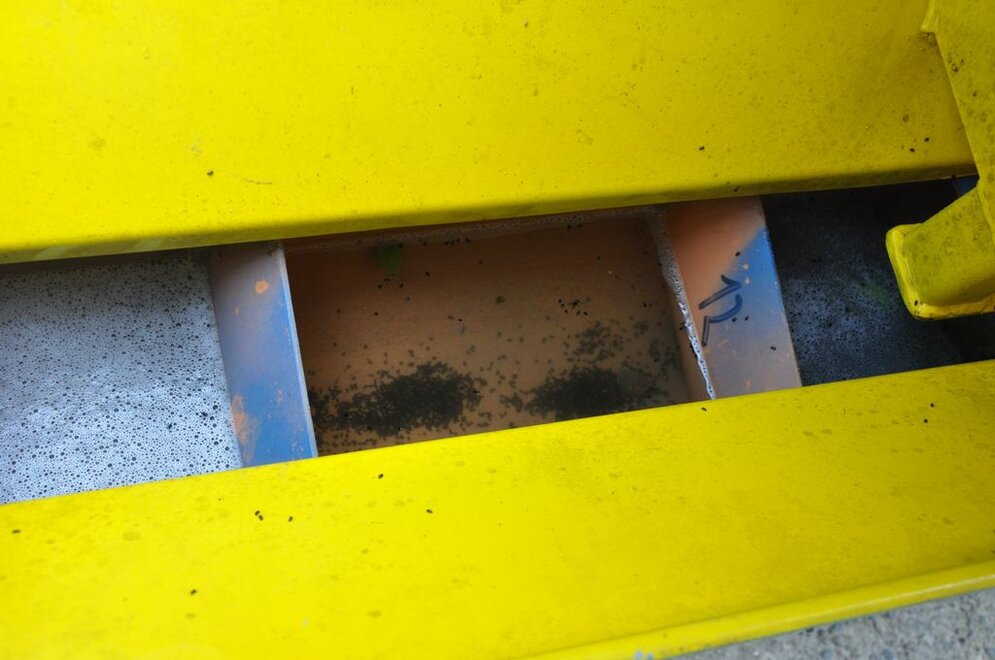Photos
Project
Alternatives against the pollen beetle
Management of insect pests in organic winter oilseed rape
For rapeseed cultivation in organic farming, pest infestation has up to now been an unpredictable, high risk. Because no biological plant protection agents are available in organic farming, alternatives are needed and should be sought.
Background and Objective
Only 0.1% of the total oilseed rape acreage in Germany is managed organically so far – that is only 2,000 ha. This is in contrast to a high demand for the production of edible oils, etc. Furthermore oilseed rape cake is a good feedstuff due to the very high content of methionine. Reasons for the low cultivation area are the high and early nutritional requirements, weed control and especially the infestation of pests. In this project we have therefore set ourselves the goal of developing environmentally-friendly, system-compatible methods by which the pest infestation can be reduced using edge strips or mixed cropping with trap crops (turnip rape) and by localized application of direct control measures in organic winter oilseed rape cultivation.
Approach
The project was conducted by the four joint project partners, the Julius Kühn Institute (project coordination), the Thünen Institute of Organic Farming, the University Göttingen and the University Kassel-Witzenhausen in the years 2008 – 2010. In the different cultivation regions we had field trials and trials under farm scale conditions. We presented and discussed the results with farmers and advisors on field days.
The project partners set different priorities, with the following four operational objectives in mind:
- Attractiveness and suitability of different varieties of trap crops (turnip rape) and mixing partners,
- reduction of the parasitic attack of the trap-strip-cropping and mixed cropping of winter oilseed rape and turnip rape,
- combination effect of direct control measures with the use of trap crops
- accompanying soil and plant analysis to survey the nutrient supply and the compensatory effect of the parasitic attack.
Results
The trials under farm scale conditions, as well as the results of the field plot experiments, documented: Turnip rape has a consistently higher attractiveness for the pollen beetle as compared to oilseed rape. In a direct comparison of oilseed rape cultivated with and without turnip rape strips, and intercropped oilseed rape with turnip rape in comparison to oilseed rape in pure stand, we were enabled to investigate the effect of the complete range of trap crops. Contrary to expectations, neither was the pest population on the oilseed rape main crop significantly reduced, nor were yields of oilseed rape increased by the turnip rape trap crop strips. Also the mixed cropping showed no positive effect of the infestation with pollen beetles on oilseed rape. The efficiency of the trap plants is much lower than the expectations of organic farmers and the additional expenses exceed the expected benefits. In summary it can be stated that the trap crop strips or as mixed cropping practice cannot recommended as a concept for the pest control, and even increased the economic risk of loss. This knowledge is very valuable in practice, since the application of trap crops is recommended and in some cases the farmer supposedly believes that the stronger infestation of the trap crop by pollen beetle might be able to successfully regulate the pest infestation and thus increase yields.
The studies on pesticides based on natural materials give some indications about which agents allow an effective control of pollen beetle. These include spinosad, a fermentation product of a soil microorganism and, stone meal, which reached a remarkable efficiency of up to 78% and a duration of action of up to 6 days. It would have to be applied several times, so that it would only be eligible for site specific application. While spinosad is allowed in Switzerland in a plant protection product for rape, such an authorization is lacking to date in Germany.
The accompanying agronomic studies highlighted the difficulties of organic oilseed rape production, which, starting from the high nutrient requirements faces problems arising from weed and pest control, which often results in high crop volatility of 0.3-4.2 t per hectare shown in practice. The plant analysis often showed an insufficient nitrogen supply , especially at the beginning of the vegetation period in the Spring. The sulfur supply was generally sufficient, but was assured by additional sulfur fertilization with authorized fertilizers in organic farming at some sites. Relationships between growing region, crop management, nutrient supply, pest infestations and the yield could not be presented in detail, because the number of investigated sites was too low and the agronomic practices varied too much.
Involved external Thünen-Partners
- Julius Kühn-Institut - Bundesforschungsinstitut für Kulturpflanzen (JKI)
(Quedlinburg, Braunschweig, Groß Lüsewitz, Kleinmachnow, Deutschland) - Georg-August-Universität Göttingen
(Göttingen, Deutschland) - Universität Kassel
(Kassel, Witzenhausen, Deutschland) -
Kompetenzzentrum Ökolandbau Niedersachsen (KÖN)
(Visselhövede, Deutschland)
Funding Body
-
Federal Ministry of Agriculture, Food and Regional Identity (BMLEH)
(national, öffentlich)
Duration
9.2008 - 3.2012
More Information
Project funding number: BÖL 06OE350
Funding program: Bundesprogramm Ökologischer Landbau und andere Formen nachhaltiger Landwirtschaft (BÖLN)
Project status:
finished

![[Translate to English:] [Translate to English:]](/media/_processed_/8/e/csm_Bildschirmfoto_2021-03-03_bearb_fc48ac88bf.jpeg)
![[Translate to English:] [Translate to English:]](/media/_processed_/8/e/csm_Bildschirmfoto_2021-03-03_bearb_ba3ec0e9d7.jpeg)
